
EMPOWERING YOUNG FEMALE ENTREPRENEURS IN DEVELOPING ECONOMIES: CHALLENGES AND SOLUTIONS
1
We believe in the power of youth. Our mission is to empower young people to address the challenges they face, whether at a global or local level.
WHAT?
HOW?
We promote youth participation by supporting young people to build their confidence and develop vital skills which are essential in many aspects of their future, especially for employment.
Empowering young people

2
Where do we work?
• We run projects for disadvantaged young people in West Africa and the UK, helping them to gain the skills and confidence needed to fulfil their potential.
• We have a global network of over 35,000 young people who we regularly consult with and who tell us what issues matter most to them.
• Our current areas of focus include: Sierra Leone, Liberia and Guinea, Luton, Tower Hamlets and Hertfordshire, although our programmes have been designed to be scalable across the world.

3
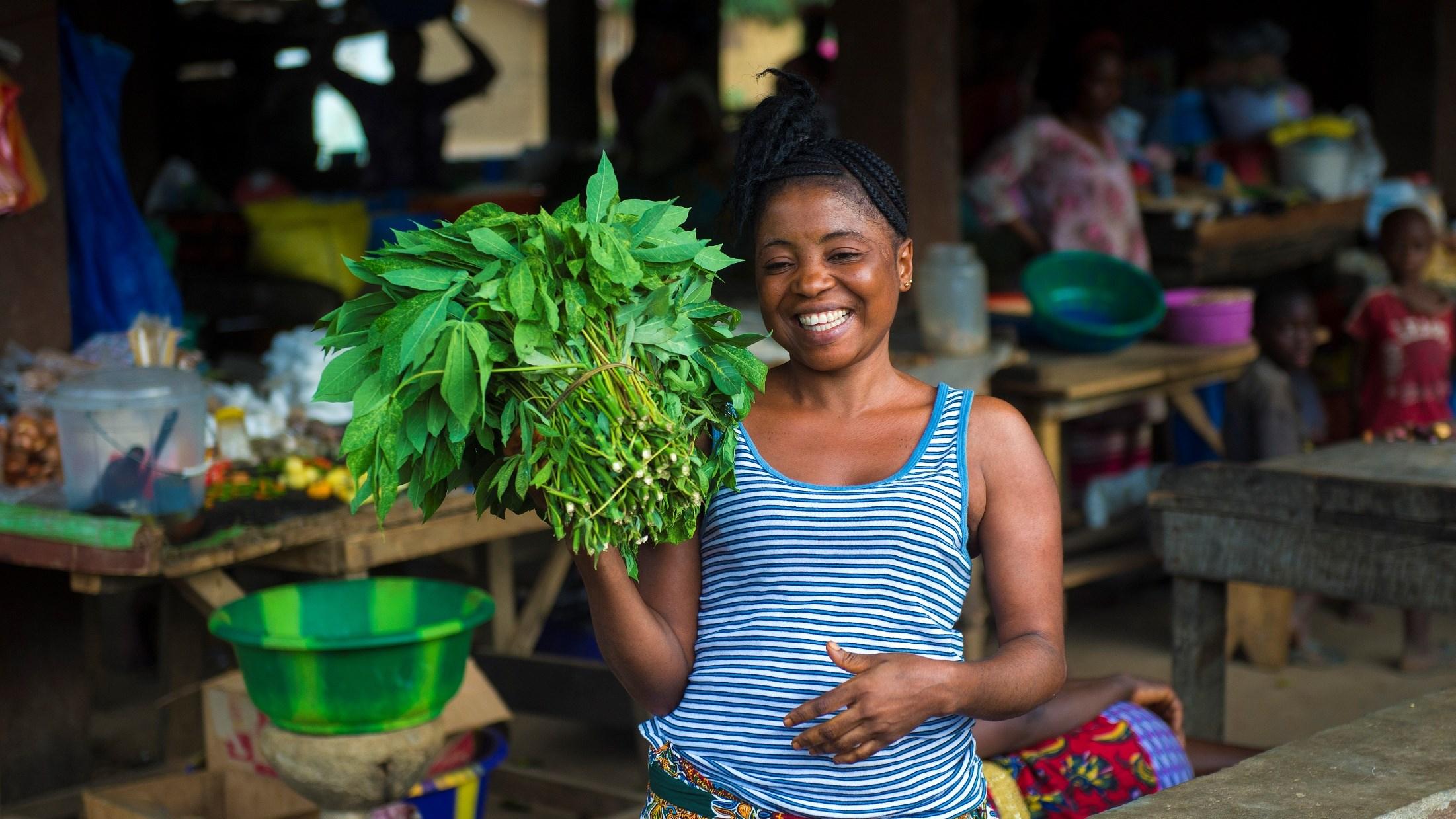
4
Introduction

Introduction
PeaceChild International is a small UK-based international development charity whose mission is to empower young people. It does so through a number of core education programmes in the UK and internationally, through advocacy in the UN and international organisations and through connecting its global community of members.
One of PeaceChild’s core programmes for eight years has been its Be The Change Academy (BTCA), which provides entrepreneurship and business skills training to young women. We operate BTCA in Sierra Leone, a country of immense natural beauty with a young and resourceful population which has tragically be held back in the wake of terrible conflict.
We believe that the informal economy is the vital first step to any societies’ prosperity. The men and women who can buy and sell can pay for education for their children and act as a sustainable source of support to their communities. But, in our experience in Sierra Leone and other developing countries, the informal economy is also the most underserved by the traditional supporters of business growth. It is much harder to receive investment, loans and basic financial services. There is also a lack of grass-roots business education to help get people into the informal economy. As a result, the informal economy often has the greatest untapped potential for growth.
The young women who we help in Sierra Leone epitomise ‘untapped potential’. The poor rural communities where they live are physically hard to reach and have limited access to the growing centres of commerce in the country. Access to education, financial services, capital and supply chains are extremely limited. But these barriers are not insurmountable, and the impact which PeaceChild has made to the lives of more than 10,000 women, their families and their communities over the years is a source of great pride.
5

This Report
This publication is PeaceChild’s thesis for how to provide an effective, sustainable and measurable entrepreneurship programme that can reach and empower young women who face immense barriers and help them to succeed.
Our programme is sector-agnostic, meaning we don’t train participants to work in a specific job. Instead, we empower them to start or grow the business which they decide works for them and which they identify their community will value. Context still matters, and what has worked for us in Sierra Leone will not work everywhere, not matter how flexible our approach. But by breaking down each of the barriers that the young women in our programme face, and explaining how we help them to overcome each, we hope that others can use and iterate on all that we have learned.
BTCA is not a finished product – we constantly scrutinise and measure its impact and alter the course to adapt to emerging challenges and opportunities. We always welcome the opportunity to engage with others who work in this field and who share our vision of a world in which young people can shape their own futures wherever in the world they grow up.
6
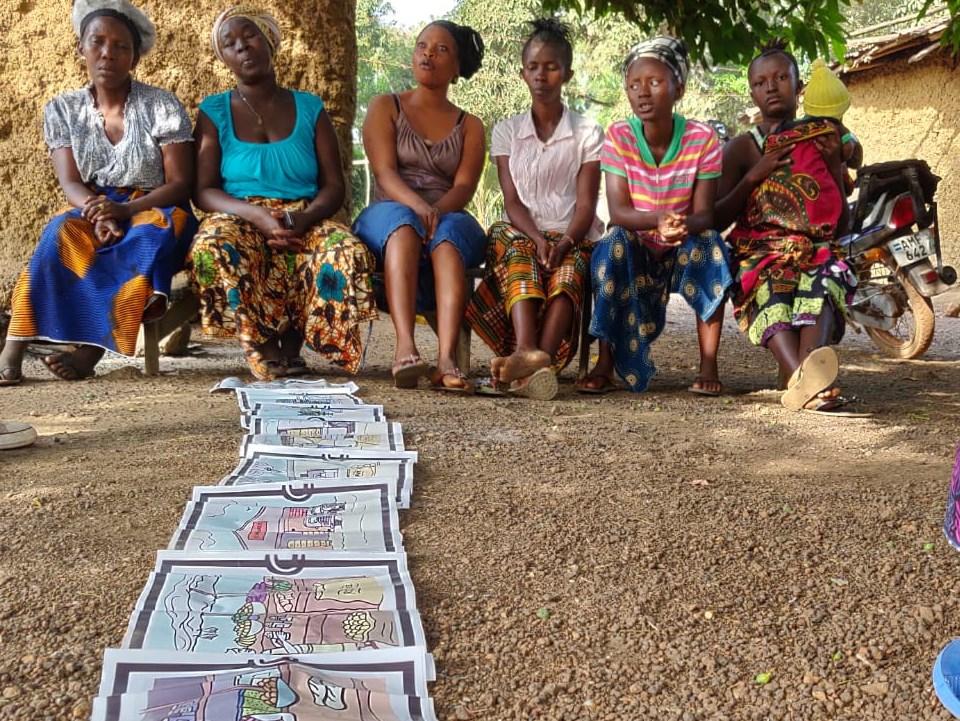
Access to Education
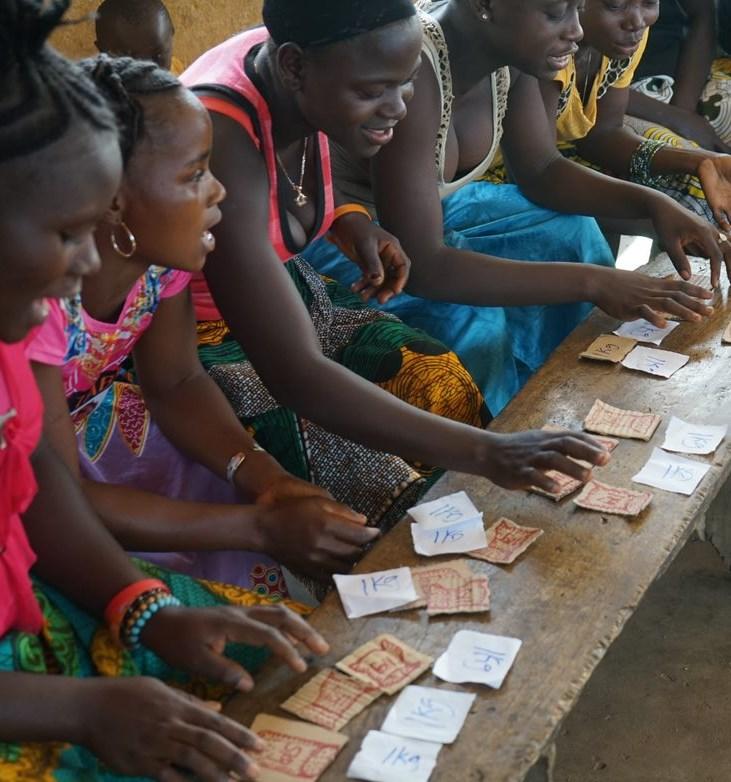
7

A programme for women who can’t read or write
A significant part of any entrepreneurship or business skills programme rests on the assumption that participants can read and write. We expect that businesses can keep records of their sales, suppliers, profits and losses. We assume that participants can write down what they have learned in one session and bring it to the next. In the rural communities in Sierra Leone where we operate the BTCA, none of this is the case.
The challenge that BTCA seeks to overcome is giving young women an education in running and growing a small business without the benefit of any foundation of literacy. To address this challenge, PeaceChild has developed a number of creative teaching techniques that our trainers use when delivery the programme.
"The training really helped me to understand how to finance my business, to ensure that I can make a living from my business.
I now understand that you need to base your business on the amount of money that you have available to you, as otherwise your business will not be sustainable."
Isatu Sheku , BTCA participant and food business owner
8

Training methodology
Firstly, and most importantly, all our training is delivered in-person by our expert trainers. PeaceChild is lucky to have established and nurtured ongoing relationships with several inspiring women and men who deliver group training sessions for 30-35 participants at a time during the first phase of each programme. These trainers are Sierra Leonean and have a deep knowledge of the local cultural, social and economic context in which they deliver our programmes. This insight it vital to ensure our training is relevant and impactful.
Secondly, our programme rely on extensive image-based training exercises, using illustrations of commercial processes, transactions and interactions to ground participants’ understanding. During each programme, the first phase of training sessions is group-based, so trainers can rely on the practical life-experiences of participants to discuss how common commercial activities operate in practice.
BTCA is sector-agnostic and focusses on providing the skills that young women need to run a small business of any kind. We regard this flexible approach as vital for building resilient local economies and communities which can adapt to changes in the wider economy should demand for particular products or services change over time. This approach also prevents the introduction of bias (on the part of PeaceChild, its trainers or any partner) as to what constitutes a ‘good business’ in the local context.
Thirdly, ‘workshopping’ and game-based learning is key to ensuring the engagement and interaction of participants in BTCA sessions. Very often, the young women in each cohort need not only to understand the theory of operating a business, but to practice doing so with confidence in a safe and supportive environment.
9

Financial Management Tool
[A key element of BTCA is the financial management tool that we train each participant to use in their business. The financial management tool is a simple version of an accounting book, which women use to record their transactions, incomes and expenses, profits and losses, borrowing and receivables as their run and grow their businesses. Given how few participants are literate, the financial management tool incorporates symbols, colours and keys in place of words and numbers.
As well as helping participants to see and understand the finances of their businesses in a simple and accessible way, the financial management tool helps our trainers to understand each participant’s needs and to provide tailored ongoing support.]
Unlike other programmes that either marginalise illiterate women or focus on already skilled young women, PCI’s programme has been recognised by the Ministry of Youth Affairs and MSWCGA - a coalition of NGOs working on gender equality in Sierra Leoneas the most effective of its type by providing best practice on empowering illiterate young women.
TBC
10

Case Study - Kadie
Kadie Koba, 18, lives in Kenema, Sierra Leone.
Growing up Kadie suffered from selective mutism, which made her feel unable to communicate with anyone other than her family. As a result, she did not feel capable of running a business. Through Peace Child's training and its group-based activities, Kadie began to feel more confident, and as her business knowledge grew and she became able to communicate with her wider community.
Following the training, Kadie began a business selling staple food items. Now she and her business are thriving, and her market research has led her to expand her business to sell rain season items.
Kadie’s mother credits the Peace Child training as having a transformative effect on Kadie: “She has gained independence; I am so proud of her and can see her having a great future.”
11

Access to financial services
12

Establishing savings groups
The financial system in Sierra Leone is minimal. It is estimated that only 12.4% of the population have access to basic financial services such as bank accounts, and anyone outside the cities has almost no access to banking facilities, either to save money or borrow it. Access to credit is limited in general, and this is particularly the case for women, who despite their contribution to the economy typically don't own land or other property they can offer as security for a loan.
Typically the best credit available to the women who PeaceChild helps is same-day trade finance – that is, wholesalers will give them goods to sell in the morning in return payment with interest in the evening. This is an expensive way to run a business and greatly diminishes any profit that the women might make from their businesses.
Consequently, personal savings or access to capital in the informal economy are essential to start or grow a business. PeaceChild helps women to establish savings groups (or ‘susus’), in which each participant will store their profits in a large metal box for safekeeping. There are a number of keys held by leading women in the group, and each participant must maintain her own record of its contents.
This seemingly simple arrangement has a number of important benefits.
13

Savings groups
Firstly, savings groups provide physical security for the savings. Given the minimal access to bank branches in rural Sierra Leone, participants would normally need to keep their cash earnings at home, where they are at risk of theft or being used by family members for other purposes. In this sense, the savings group acts like a bank vault. Where cash is held collectively, the whole community benefits from its safety.
Secondly, the savings group and the ledger that each woman must keep of its contents creates a degree of accountability. Each must evidence their income to the others, and the women become accountable to their peers for how they use the money that they have saved. This governance structure helps each woman to create sustainable businesses in the long-term.
Finally, and perhaps most importantly, the women in a savings group can lend their savings to each other. Borrowing is documented by all the participants and they do charge interest, but the access to fairly-priced loans is vital for women to avoid a cycle of short-term and expensive debt.
Sometimes, the women in a savings group will collectively decide to group their funds together to buy a piece of land. The income from farming the land will be paid back to the savings group, with interest. The participants consider (broadly speaking) that the land is owned by the savings group.
Both types of investment of savings group funds, either in loans to other participants or in joint investments, create valuable economies that benefit their entire communities. As drivers of development and investment, the participants in savings groups also become more empowered members of their communities.
14
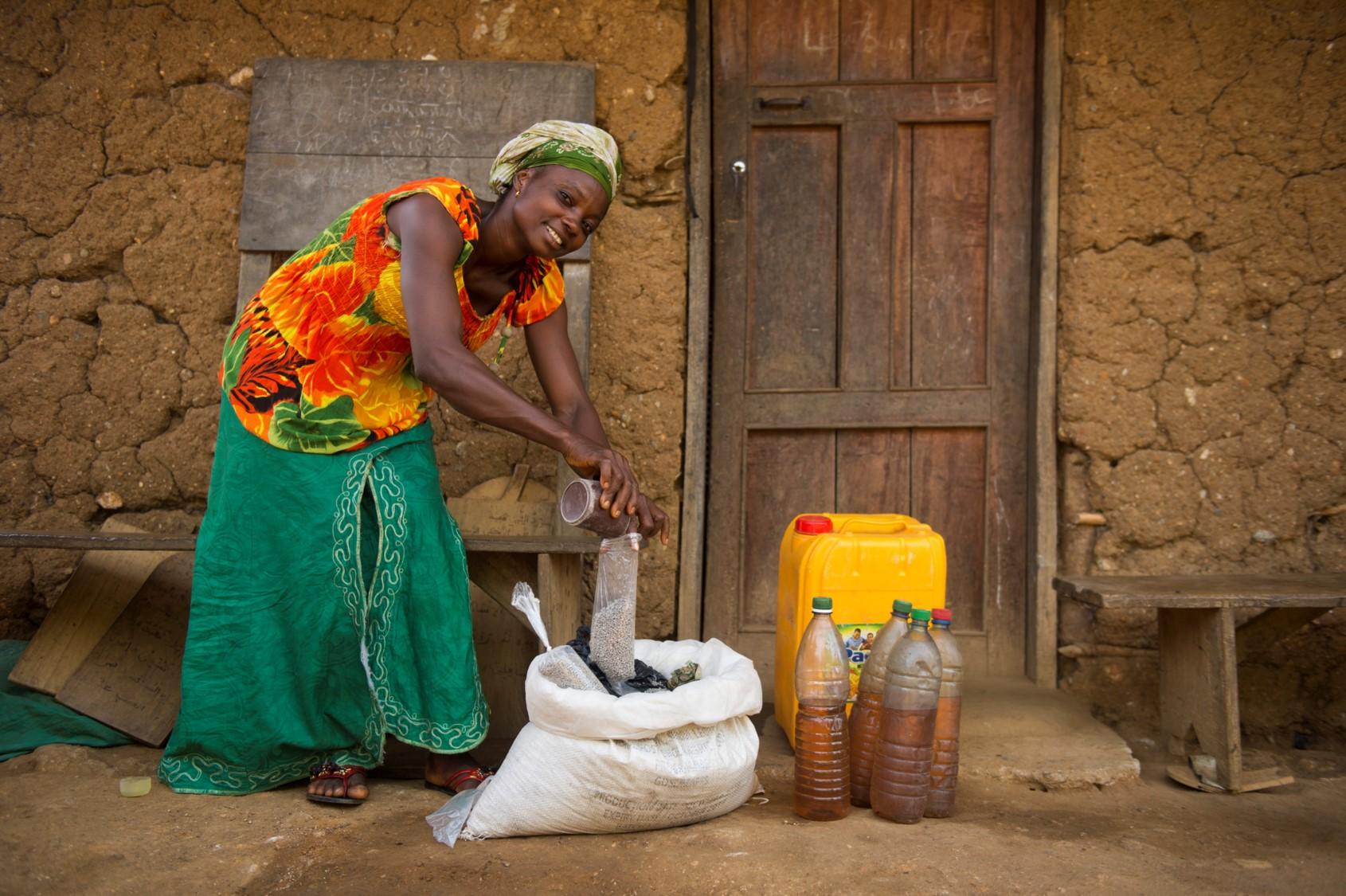
Savings groups in action
“I am part of a susu with 20 other women. Every so I get 400,000 to buy products.
I track what I have paid into the susu and manage my money using stones, when I pay in I put one in a cup, every week I add one stone so that I know how many weeks I have paid in and how much money I should be getting at the end.
I learnt that idea in the training, as I cannot read and write but they explained that I need to be able to understand my money"
Kadie Hassan, savings group participant and fertilisier business owner
15
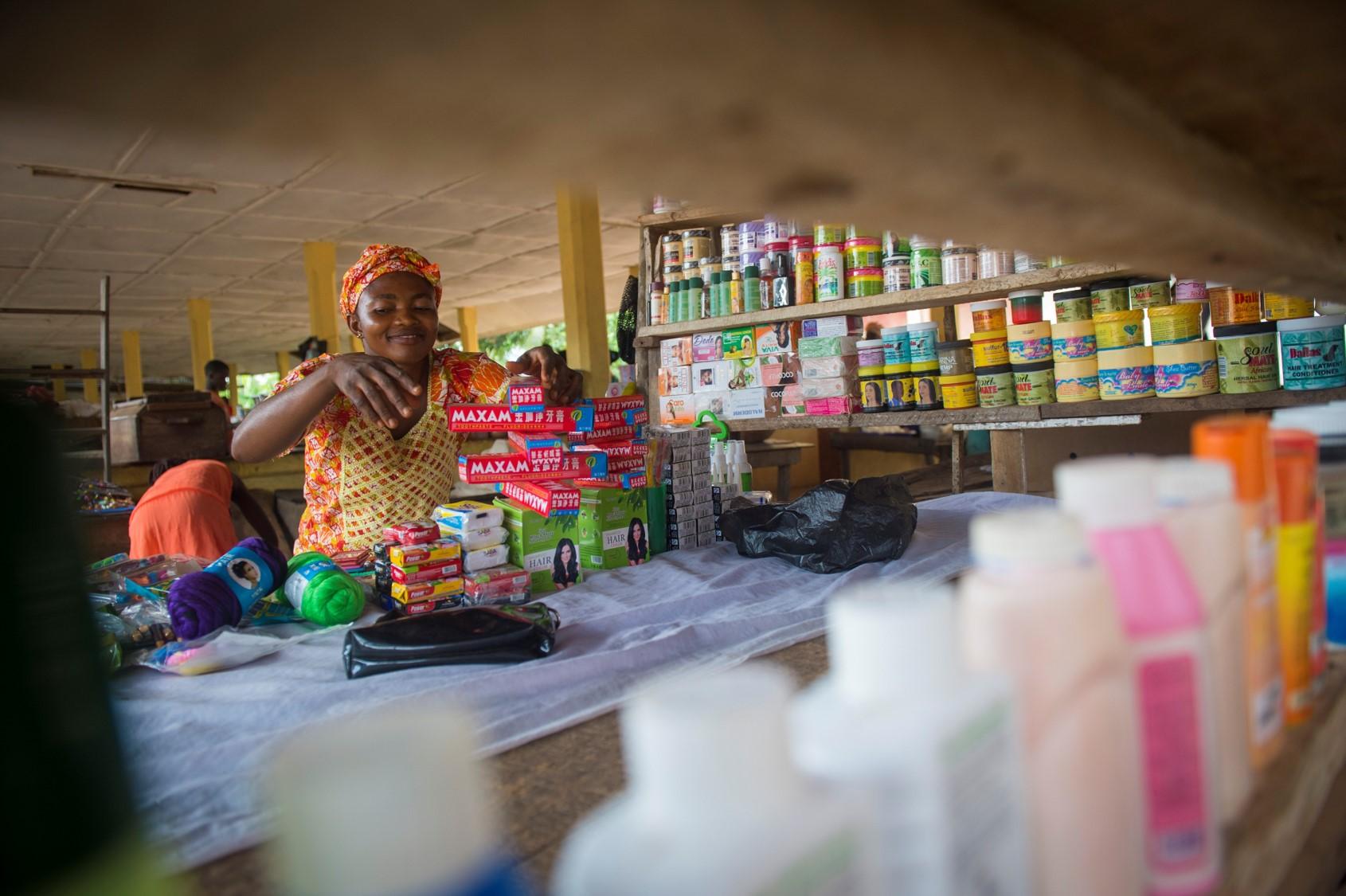
Access to supply chains
16

Access to supply chains
An important hurdle for women starting or growing a business is accessing equitable supply chains that give them reliable access to the wholesale materials that they need. The participant’s in PeaceChild’s programme are at a disadvantage both because they are women and because they live and work in rural villages which often have limited access to economic hubs within Sierra Leone. They therefore lack access to supply chains.
PeaceChild helps by making direct introductions of BTCA participants to local service providers who can, or may in future, be able to supply with them with wholesale or raw materials for their businesses. Making these connections, with the help of PeaceChild trainers’ credibility within the community, will give participants both immediate and longer-term networking benefits.
In addition, former BTCA participants continue to support each other through entrepreneur networks. PeaceChild makes direct connections between entrepreneurs who can mentor or advise each other after they have completed the BTCA programme, and the broader network gives participants the opportunity to support each other organically when they can. Peace Child has established more than 30 networks of female entrepreneurs, which make an important contribution to the wider economy and society of their communities.
17
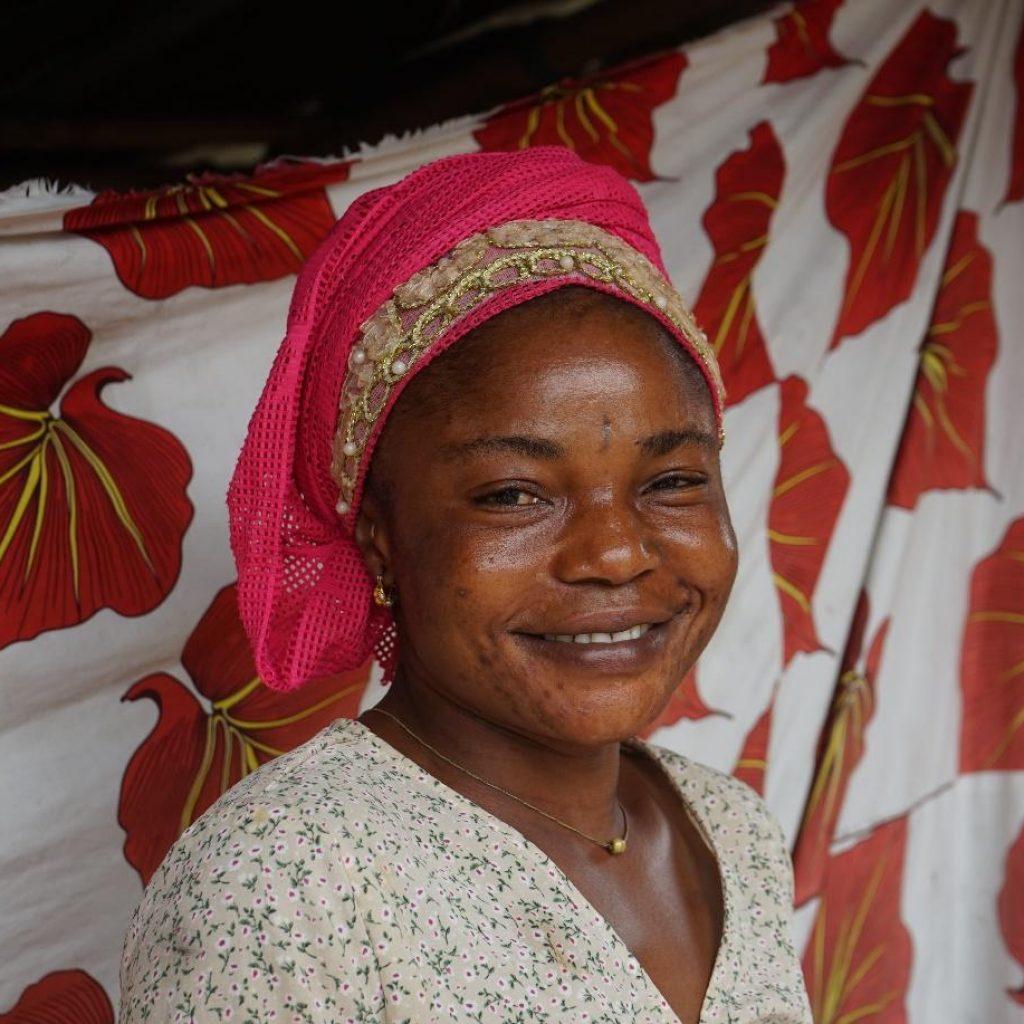
Case Study - Isatu
Isatu Sheku lives in Deima village, Sierra Leone, with her husband and six children. She has no formal education and is not able to read and write, but runs a business selling cooked food.
Isatu joined Peace Child’s entrepreneurship training to learn how to manage and finance her business more effectively.
Isatu found that by paying for her raw materials from profits rather than on loan, she could reduce her overheads and retain a greater portion of her sales.
Since completing the training, Isatu has seen her business turnover increase by 650%. Isatu’s success has made her see herself as the head of the household.
ot only have I been able to repay the money I owed, in fact now I can provide for my family and now even give my husband loans to buy materials he needs to farm."
18

19
Empowerment

Empowering female entrepreneurs in their communities and homes
PeaceChild’s aim, through BTCA, is to enable young female entrepreneurs to start and grow successful and sustainable enterprises, and 100% of the participants who took part in the training said they were now confident that they can successfully start and run their own businesses. The impact of the BTCA is that we have already helped over 7,000 young people to escape poverty. But the effect of BTCA on these women, and their place in their communities, is more profound that just economic prosperity. Through surveying previous BTCA participants, we can see this in three important respects. Firstly, the economic empowerment that comes with running a successful business results in a change, within their communities, in the perception of women’s role in society. Participants experience improved equality in gender-related power dynamics due to their increased incomes and raised level of financial confidence.
20

Empowering female entrepreneurs in their communities and homes
Secondly, participants report increased levels of decision-making power in the economic and public affairs of their communities, spheres which are normally male-dominated. When women are in a position of economic independence, they more respected in their communities and are better able to influence how those communities operate.
Thirdly, women report reduced levels of gender-based violence. We have only anecdotal evidence of this, due to the limited scope within PeaceChild’s work to measure the wider impact of BTCA, but we hope this is a data set that we can build on in future.
Each of these impacts help future female entrepreneurs to access more opportunities, and enable all women in Sierra Leone to achieve equality.
"I am no longer afraid to talk and make my views heard with my husband and family. From the training I got so confident and now I am able to stand on my own. I can talk for myself, I don’t need someone to talk for me.”
Mabintu Mansaray, BTCA participant and cosmetics business owner
21

Case Study - Nancy
Nancy Jah is an entrepreneur and one of the facilitators who delivers BTCA in Kenema district.
We’re immensely proud of the work that Nancy and our other facilitators do in these communities, and also of her personal journey as a young female entrepreneur.
"I am leader for my family now, but also beyond - when the young women see me, another women being in a job and having male colleagues who are my equals they really admire me. I can always use myself as an example to them, that I lead from the front. They can see me riding a motorbike, delivering training, discussing with local officials of the communities and it gives them the belief that they can do that also. I feel from seeing me they can see that if you work hard, no one can stop you as a woman, and if people do believe that women are not meant to do things, I think I am an example of women being able to do anything."
22
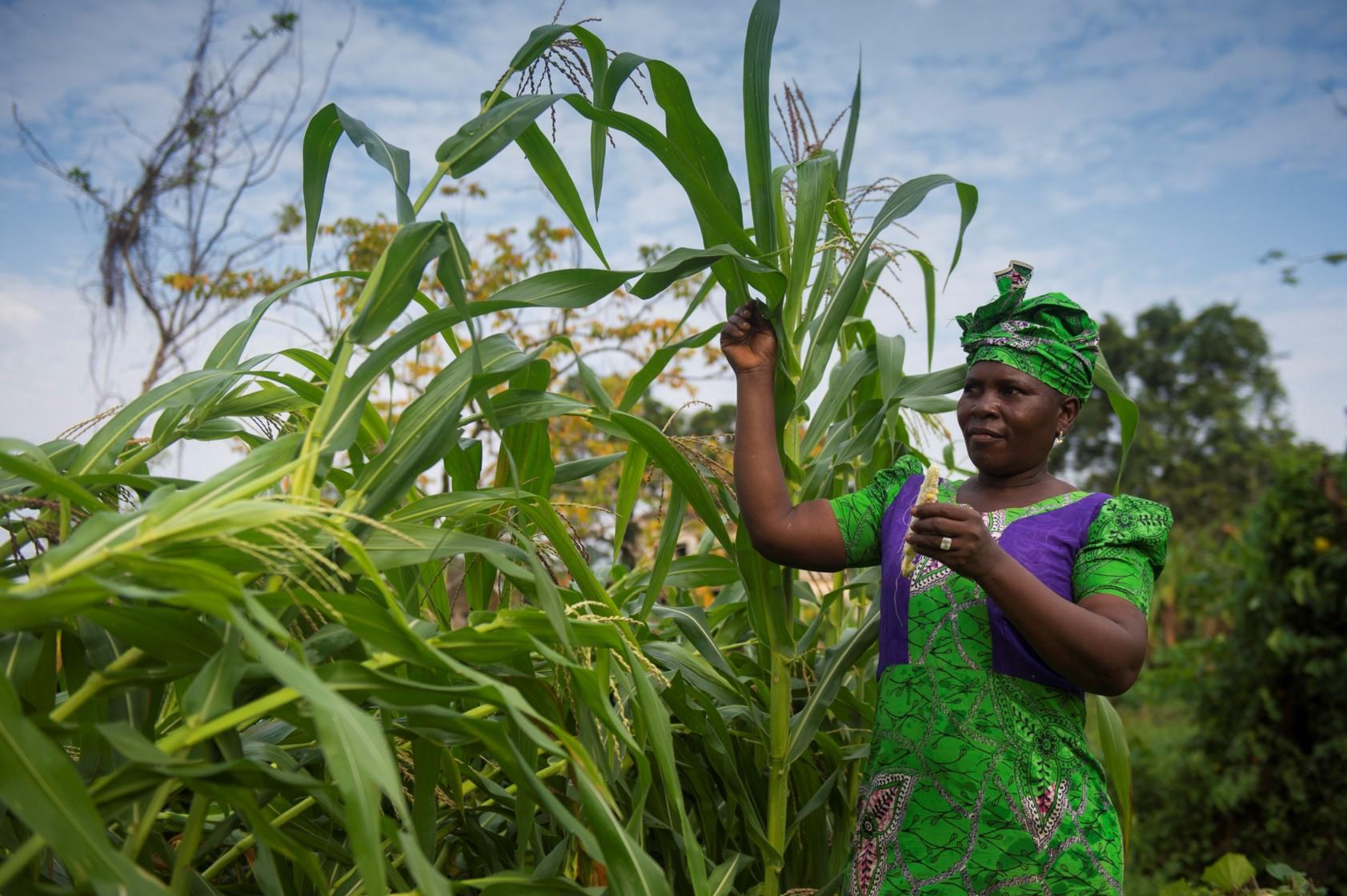
23
Conclusion

Never stopping
We see the impact that your support has on the lives of young women in Sierra Leone. It is life-changing. The during the course of each BTCA training cohort, participants report their business income rise from 15,000 le (£1.25) to 88,000 le (£7.80) a day. This isn't a lot to us, but for a woman in rural Sierra Leone it is transformational.
Because we've worked in the same areas of Sierra Leone for eight years, we see how the businesses of former BTCA participants continue to grow, how these women support each other through the savings groups and networks we have established and how their role in their communities has changed for the better.
We want to do more. We constantly look for opportunities to expand BTCA into other communities in Sierra Leone and elsewhere in West Africa. We're also working with savings groups as they mature, to support innovative community investments. We know that as the businesses of former BTCA participants grow, their needs for support change, and we are here for them.
Our funding outlook is uncertain. Due to cuts in government funding, it's increasingly difficult for small charities like Peace Child to plan ahead. Our model is a resilient one, but we need your support.
Be the change. Donating £60 to Peace Child pays for BTCA training for one young woman. Your support has a measurable, visible, life-chaning impact. Please help.
24
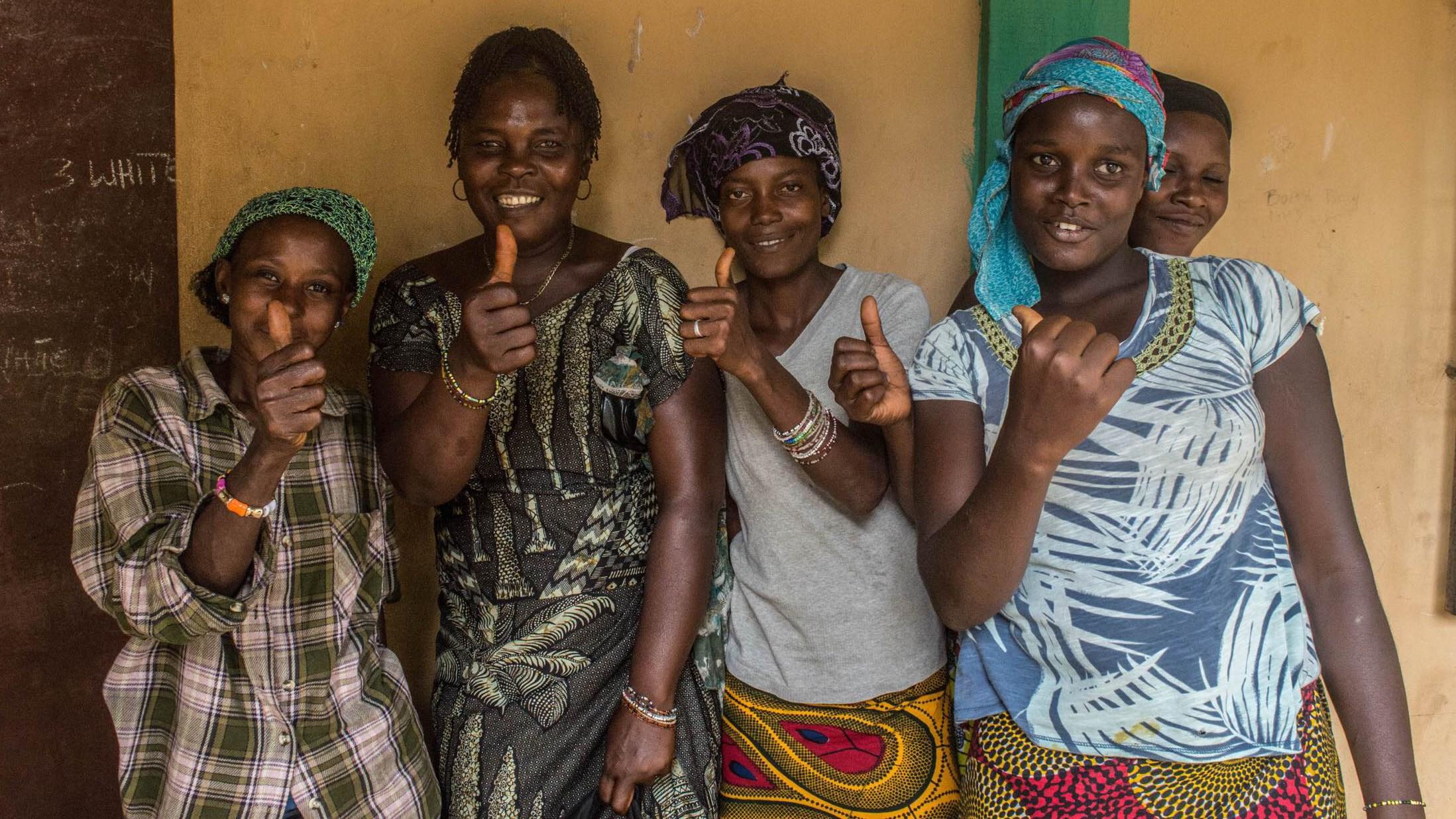
Spread the word
25
www.peacechild.org
“A small charity with a huge impact”

26

Thank you! peacechildinternational @peacechild peacechildinternational adriana@peacechild.org We are so grateful for your interest in partnering with us Peace Child International. UK registered charity (No. 1095189) W: peacechild.org E: adriana@peacechild.org T: +44(0)1223782092 27















